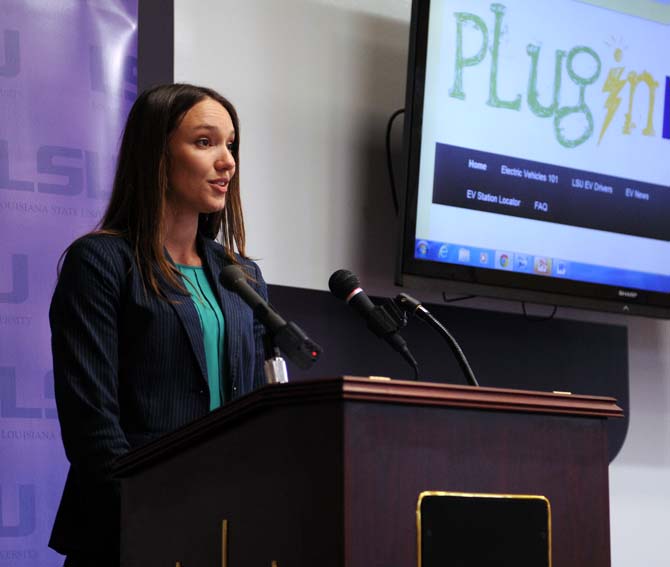The Greater Baton Rouge Clean Cities Coalition, through its Plug In LSU intiative, is taking steps to help University students, faculty and staff quickly locate electric vehicle charging stations on campus and across the state.
The Plug In LSU website, pluginlsu.org, features an interactive map to locate charging stations and educational resources to improve and encourage the use of plug-in electric vehicles, or EVs, and plug-in hybrid cars on campus.
“We hope that this website is an education tool for the campus community and we hope that it helps people understand that there are ways of avoiding pain at the pump,” said GBRCCC Executive Director and Program Coordinator Lauren Stuart.
The two EV charging stations on campus — one near Kirby Smith Hall and the other in the X-174 commuter lot off of Nicholson Extension — were implemented through a partnership with Entergy Louisiana LLC and Entergy Gulf States Louisiana LLC, a local electricity provider, in July 2011.
By registering with the Office of Parking, Traffic and Transportation to obtain a charging station card, the University’s plug-in vehicle users can fully utilize the stations on campus, which have reserved parking spaces and are capable of providing a full charge to any model of electric vehicle at no cost to the user.
The Plug In LSU website, unveiled at a news conference Thursday, now allows individuals to register online to receive a card for the LSU charging stations.
The website also includes educational resources with links to environmental information about EVs as well as a section entitled “Electric Vehicles 101” that corrects common myths about electric vehicles.
The “EV Station Locator” section of the site allows users to enter their ZIP code and locate charging stations in the Baton Rouge area on a map operated through the U.S. Department of Energy’s Alternative Fuels Data Center. By clicking on the map, users can expand their search for charging stations nationally or narrow their search to find certain types of charging stations.
“We are also going through Residential Life to distribute information for students who live in on-campus housing, and that information involves considering purchasing electric vehicles as well as details about how to charge on campus if you already have one,” Stuart said.
Stuart said when the EV stations were installed on campus in 2011, electric vehicles were not even available to the Baton Rouge market.
“We were getting ahead of the curve,” Stuart said. “Now they are available and we have just a handful on campus, but hundreds have been sold in the Baton Rouge area so we expect to see that number rising quickly.”
According to Pike Research, a total of 3.2 million plug-in electric vehicles will be sold worldwide by 2015.
When the charging station program began, the University had 10 charging station cards available for distribution and has since met this allowance.
In response to the expectation of increased usage, Assistant Director of Facility Services Tammy Millican said the University is currently in the process of purchasing 10 additional charging station cards.
“As gas prices increase, electric vehicles offer drivers a much more affordable fueling option,” Stuart said.
In addition to the Plug In LSU initiative, GBRCCC is partnering with car dealerships in Baton Rouge and has spoken to solar companies about powering the charging stations in an effort to expand the charging infrastructure across the city, Stuart said.
“Beyond the personal benefits, driving an electric vehicle advances domestic energy security and local environmental quality,” Stuart said.
The LSU College of Engineering and Entergy are also able to collect data about the usage of the stations to research the impact the chargers have on consumers and the campus power grid.
“As the state’s flagship university, it is important that our teaching and research missions each address clean energy and alternative fuel options,” Richard Koubek, dean of the College of Engineering, said in a news release. “Today, researchers are working intensely to explore new fuels and vehicle technologies, to provide more efficient choices for consumers and study the effects of EV charging on power grids, like the one here at LSU.”
Statistics from ChargePoint, the company that operates and monitors the University’s EV charging stations:
From October 2012 through April 2, 2013 the University’s two charging stations:
– provided 1,047 total charge-ups
– using 3.77 megawatts of electricity
– saving 5,357.146 kg of greenhouse gas emissions
– saving 630 gallons of gasoline
– costing the University a total of $204.16 in energy costs for both charging stations between November 2012 and April 2013, according to LSU Campus Sustainability.






